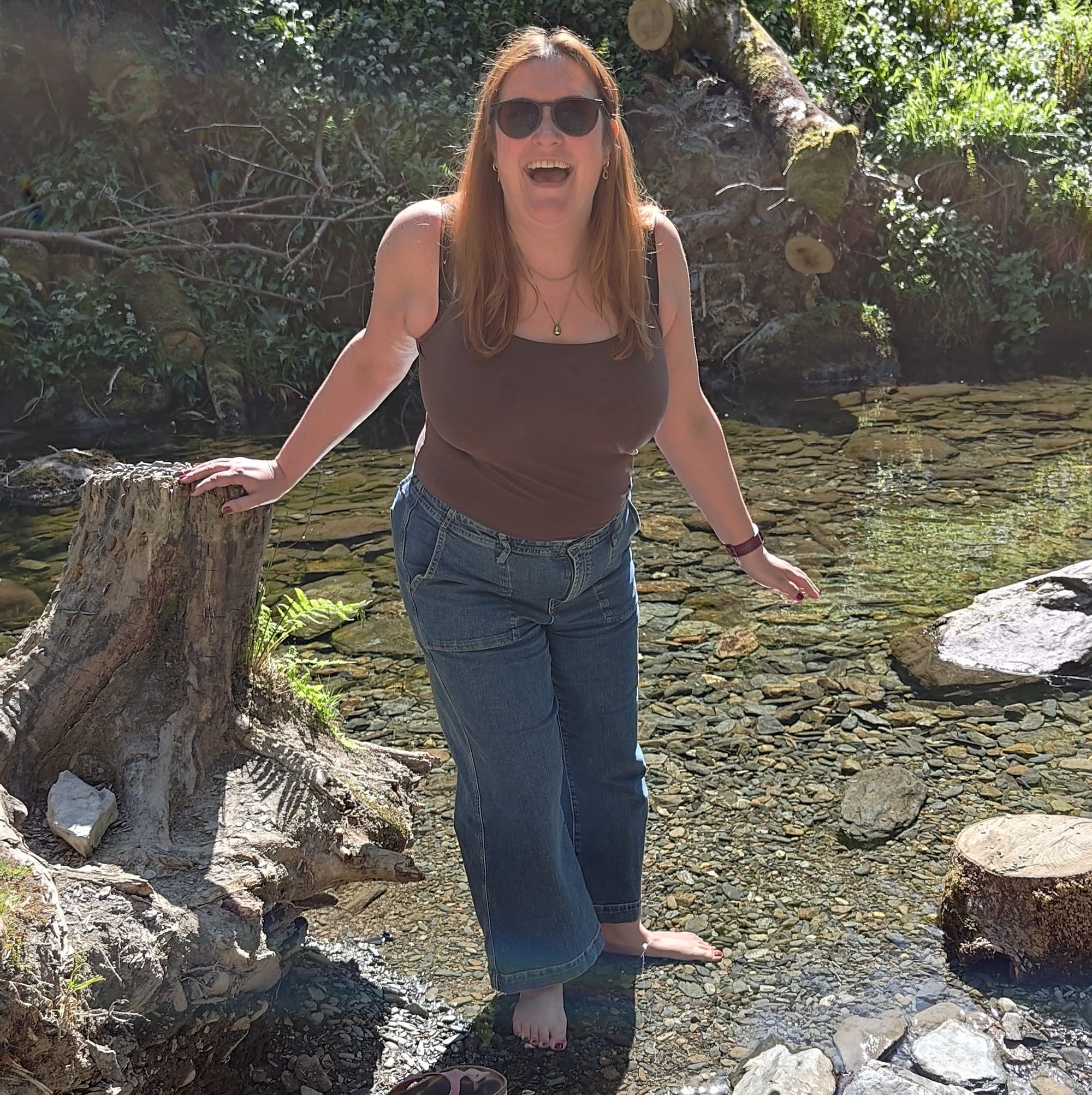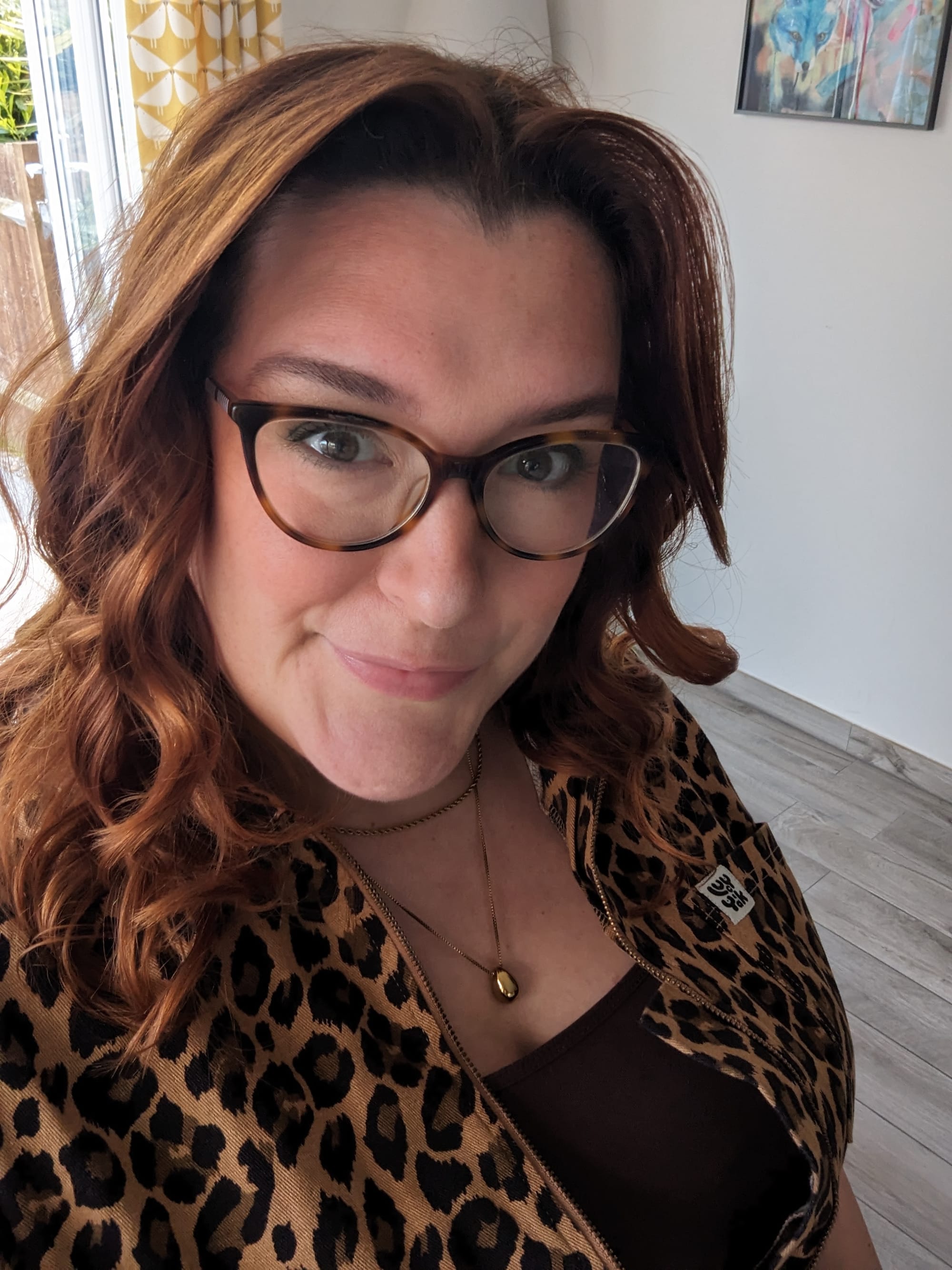How I’m learning to love my fat body

I wrote in my last post about letting go of weight loss goals, and how this can lead us to making changes which are both more enjoyable and more sustainable. However, “letting go of weight loss goals” is not as easy as it sounds. In this post I’ll talk about some of the ways I’ve been working on feeling happier in my own body - and also why this is a problem that’s bigger than how we feel when we look in the mirror.
Impossible standards
We all live in a world that still hugely prizes how people (especially women) look, and that also demonises fatness as something which should always be avoided. We only need to look at how the media speaks about women and their bodies to get messages that we should stay looking young and slim (or the new fashion, “strong” which is better, but still an appearance ideal). Even if we actively disagree with (or even get angry at!) what they’re saying, it’s impossible not to internalise these messages, even unconsciously. And the industries which sell us things to make us slimmer, younger, and more beautiful - they profit hugely from our insecurities.
But all bodies are different shapes and sizes. Even if we all ate and exercised the same amount, we’d still be different shapes and sizes. The societal pressures we experience push us to all work towards the same “ideal”.
It doesn’t have to be this way
“It is literally impossible to be a woman. You are so beautiful, and so smart, and it kills me that you don't think you're good enough. Like, we have to always be extraordinary, but somehow we're always doing it wrong. You have to be thin, but not too thin. And you can never say you want to be thin. You have to say you want to be healthy, but also you have to be thin.”
Everyone seemed to resonate with the famous America Ferrara speech from Barbie - about how women are set impossible standards that we just can’t reach. But are we actively doing anything to dismantle these pressures, or pushback against them? Or are we just accepting that it’s the case, and feeling bad about ourselves as a result? You deserve more - you deserve to live your life and be happy and confident, regardless of whether you fit into the box of the ideal body.
I’m afraid to say that getting there takes a lot of “unlearning” of messages that we’ve been given all our lives, while living in a world that is constantly reinforcing those same messages. But I wanted to share how I personally have been trying to get there.
My toolbox for working towards loving accepting my body
Seeing it as a cause that’s aligned with my values
I think the main game changer for me was viewing body acceptance as hugely important for equality and fairness. Equality and fairness are my two most important values - principles that are really important to me, that I try to live my life by (find yours here!). When I started educating myself about these topics, it was like a revelation: as long as I was not accepting my body, and judging others for theirs, I wasn’t living by these values that I hold so dear. This reframing I think is why I continue to strive to accept and support all bodies, including my own. It feels fundamentally important to me.
Educating myself, and surrounding myself with fat experiences (and bodies)
I read books to understand this space, and to hear others’ experiences (including people fatter than myself). I started with Body Positive Power by Megan Crabbe, and particularly loved Happy Fat by Sofie Hagen. I have listened to every episode of the Maintenance Phase podcast at least once (many twice!). I cleaned up my social media feeds: anyone who made me feel bad about myself, or jealous of their appearance, I unfollowed - and actively followed lots of brilliant fat women (currently loving Lauren Smith and Kenzie Brenna).
Take a moment to think about the people around you, in the real world and online. Are you exposed to fat people and their experiences? Evidence shows that direct contact with a group makes us less likely to discriminate against them - so even the science says that you make more fat friends (start with me - hello! 👋)
Investing in clothes that make me feel good - not just smaller
Early on in my journey, I got rid of all the clothes that were too small for me, or felt too tight. All they were doing was reminding me of what I used to be, and making me feel bad about it. Getting rid of them helped me to accept my body as it is right now. More recently, I got a style analysis with Style Me Happy, which helped me to know which colours and styles most suit me. This has honestly been transformational for me - I feel so much happier and more confident in my wardrobe (I’m a dark autumn, if anyone’s interested 😉). I’ve even recently been pushing myself out of my comfort zone, wearing clothes that celebrate rather than hide the bits of me that I’ve struggled to love (oh hey, little round belly)
I’m very aware that I’m fortunate enough to be able to buy new clothes when I need or want them, and not everyone has this privilege. If you need to, sit this one out - or take it slowly, and use options like selling on Vinted rather than throwing away.
Focussing on the important things in life, rather than how I look
We only get one life, and honestly, it’s far too short to spend it trying to shrink ourselves. I definitely still have difficult body image moments, but when this happens, I focus instead on all the things that are great about me and my life. It’s also helpful to take a moment to think about where that thought is coming from, and to think about something kind to say to myself instead (which can often just be “I’m working on feeling better about this, and it’s hard, but I’m getting there”).
When it comes to photos, we often are drawn to looking at the bits we hate. But a photo is ultimately a memory - if we shy away from having them taken, we’re missing out on capturing those memories, and denying other people the chance to capture us in their memory, too. I now try to think about photos as memories, not something in which we need to look perfect. Which is why you all get to enjoy delights like this, which I previously would have hated but now LOVE because it makes me laugh so much:

Stop putting weight loss on a pedestal
I stopped weighing myself. Not putting a number to how I felt in my body was really powerful. It helped me to de-centre it, and to focus instead on how I feel.
I also actively stop myself from commenting on other people’s weight. When we say to someone “you’ve lost weight, you look great!” often what they (even unconsciously) hear is “you were too fat before” or “you looked worse before”. Given that most people regain the weight that they lose, these messages can feed into us feeling negatively about our bodies. I don’t like it when people comment on my own weight, and I won’t comment on theirs. There are so many ways to complement a person that don’t include their weight - why not try “you look so happy!” or “I’ve been really impressed with all those amazing blog posts you’ve been writing lately!” 😉
But we need to go beyond our own bodies…
This work on how we feel about our own bodies (often referred to as “body positivity”) is important - but it’s only part of the picture. These societal pressures to look an ideal way affect all of us - but they affect fat people disproportionately more. This shows up as a (still very socially acceptable) form of discrimination: fatphobia. How we think and talk about people (even something as seemingly innocuous as making fat jokes) impacts how we treat ourselves, and those close to us. While we hold onto some fatphobia, it will hold us back from accepting our own bodies.
Fatphobia
Many of us might hate our bodies, but for most of us, it doesn’t affect how we interact with the world. Not fitting into chairs in restaurants, or on planes, or even having sufficiently sized medical equipment like MRI machines to fit your body, can be distressing or even life threatening. Not to mention the fact that people in bigger bodies are more likely to be discriminated against at work, and treated poorly by their doctors (e.g. spending less time with them, assuming problems are simply due to weight).
This weight stigma is hugely harmful. Evidence shows that this has a negative impact on people’s health, and ultimately perpetuates weight gain (turns out shaming people into losing weight really isn’t helpful - shocker!). This might be affecting you, or people you care about - now, or in the future (because guess what? Bodies change!).
I realised that I had a huge amount of internalised fatphobia (I still do, but less so), and that in order to feel more at peace with food and my body, I had to work to reduce it. It’s the only way to let go of the fear of getting fatter - at any size. Also, if we work on this, we’re not only helping ourselves, we’re helping other people - and helping to reduce some of that harmful weight stigma.
The last tool in my toolbox: actively seeking to challenge fatphobia
Beyond just improving how I feel about my own body, it’s important for me to challenge fatphobia, in myself and others. I think this is especially important for me, given that while “fat”, I still hold a huge amount of privilege: I’m a “small fat” (so my body size doesn't usually cause me accessibility issues), I’m white*, and I’m middle class. It’s not enough for someone like me to just feel better in myself - I also need to do the work to lift other people up.
I try to do this through sharing things and raising awareness, talking about it with friends and family, and of course through this blog itself. It’s about pointing out when things are fatphobic or could be offensive or inaccessible to those in bigger bodies. Even something as simple as looking at the chairs when booking a restaurant or show with a fat friend, and adjusting your choice to make them more comfortable.
But it’s also about challenging and adjusting my own thoughts. We’re all fatphobic in some way (just as it’s impossible not to be racist when living in a racist world), so it’s about actively challenging that. I once read (apologies, I can’t remember where!) that your first thought is automatic and driven by the way we’ve been shaped by the world we live in. Your second thought, that’s what reflects who you truly are. We can’t stop those automatic first thoughts, but we can acknowledge where they come from, and work hard for our second thought to be more kind, more inclusive, and more reflective of who we are.
This is a teeny tiny step towards “fat liberation”. The idea that everyone is deserving of respect, happiness, and health, regardless of their size - but we must actively work to dismantle fatphobia to get there. A great first step towards reflecting on your own fatphobia is watching this amazing documentary, Your Fat Friend (also available on Jolt, if you’re outside the UK).
How will you work towards body acceptance?
I’d love to know where you’re at now in terms of body acceptance, and what you’re doing to try and improve it - drop your thoughts in the comments below. And if you know someone who struggles with this stuff, why not forward this post onto them?
If you’re struggling with this and want a bit of support, this is something that I actively work on with people in my health coaching. It’s such an important step in moving towards treating our bodies better. If you’re interested, find more info here.
-------------------------------------------------------
*Fatphobia is very much rooted in racism - if you’re interested to learn more, I highly recommend “Fearing the Black Body” by Sabrina Strings
Full disclosure, I will make a tiny amount of money if you purchase using the Amazon links in this post (gotta pay that mortgage somehow 😅)
